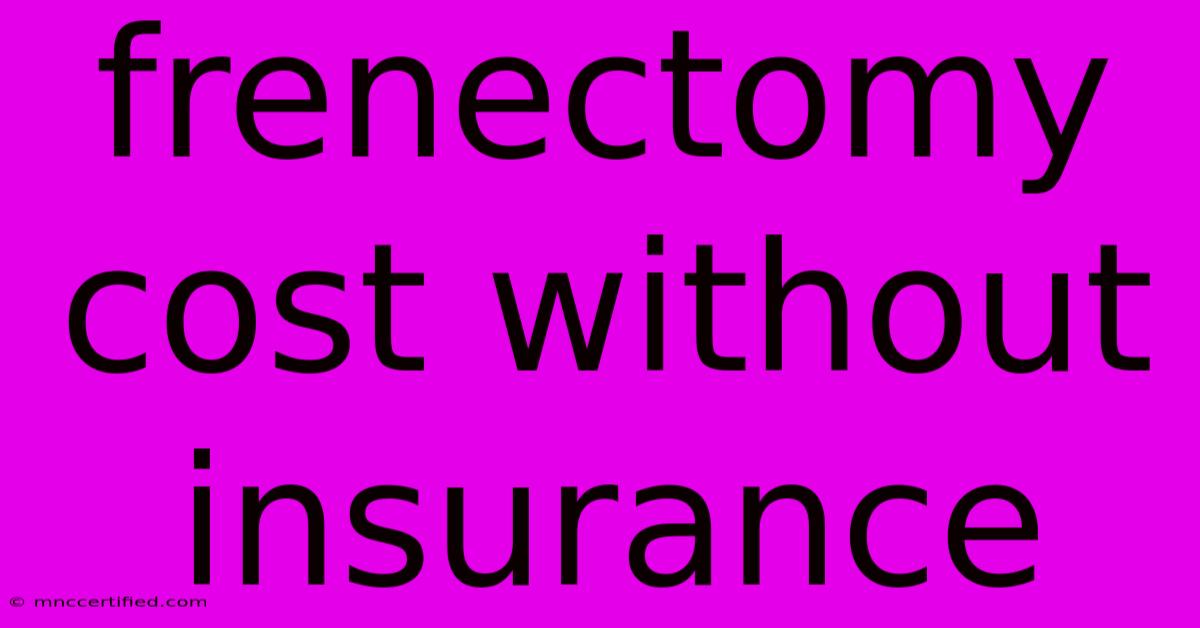Frenectomy Cost Without Insurance

Table of Contents
Frenectomy Cost Without Insurance: A Comprehensive Guide
Planning for a frenectomy? Understanding the costs involved is crucial, especially if you don't have insurance coverage. This comprehensive guide breaks down the potential expenses, offering you a clearer picture of what to expect. We'll cover various factors influencing the price and offer tips for managing the financial burden.
What is a Frenectomy?
A frenectomy is a surgical procedure to remove a frenum, a small piece of tissue connecting the lip or tongue to the gum. A lingual frenectomy addresses a tongue tie, while a labial frenectomy addresses a lip tie. These procedures are often performed on infants, children, and adults experiencing issues like speech impediments, breastfeeding difficulties, or gum recession.
Factors Affecting Frenectomy Cost Without Insurance
The cost of a frenectomy without insurance can vary significantly depending on several factors:
1. Geographic Location:
The cost of living and healthcare professional fees differ drastically across regions. A frenectomy in a major metropolitan area will likely be more expensive than in a rural setting. Research costs in your specific area for the most accurate estimate.
2. Type of Frenectomy:
A simple frenectomy is typically less expensive than a more complex procedure. The extent of the tissue removal and the technique used (laser vs. scalpel) will impact the final cost. A laser frenectomy may be more expensive initially but could offer advantages like faster healing and less bleeding.
3. Anesthesia:
The type of anesthesia used significantly affects the cost. Local anesthesia is generally the most affordable option, while general anesthesia for infants or particularly anxious patients increases expenses considerably. Discuss anesthesia options with your surgeon and consider the pros and cons based on your individual needs.
4. Surgeon's Fees:
Surgeons' fees vary widely based on their experience, reputation, and location. Get quotes from multiple surgeons to compare prices and choose a provider who best suits your needs and budget.
5. Post-Operative Care:
Post-operative care might involve follow-up appointments and medications. These additional costs should be factored into your overall budget. Inquire about the expected post-operative care plan and related expenses beforehand.
Estimated Cost Range
While precise figures are impossible to provide without knowing the specific circumstances, a frenectomy without insurance can typically range from $500 to $3000 or more. This broad range underscores the importance of obtaining detailed quotes from multiple providers.
Managing the Cost: Payment Options and Financial Assistance
Facing a significant medical bill without insurance can be daunting. Here are some options to consider:
- Payment Plans: Many surgeons offer payment plans to help patients manage the cost over time. Negotiate a payment plan that fits your budget.
- CareCredit: This medical credit card can help finance healthcare procedures. Research the terms and interest rates carefully before applying.
- Crowdfunding: Platforms like GoFundMe can help you raise funds from friends, family, and the wider community.
- Negotiating Fees: It's often possible to negotiate the price with the surgeon's office, especially if you're paying in full upfront.
Finding Affordable Frenectomy Options
- Comparison Shopping: Obtain multiple quotes from different oral surgeons and dentists in your area.
- Dental Schools: Dental schools often offer more affordable services, though the wait times might be longer.
- Local Clinics: Community health clinics or dental centers might provide discounted care.
Conclusion: Planning for a Frenectomy Without Insurance
A frenectomy without insurance requires careful planning and budgeting. By understanding the factors influencing cost, exploring various payment options, and researching affordable providers, you can manage the financial aspects of this procedure effectively. Remember to always discuss payment options and potential costs upfront with your chosen healthcare provider. Thorough research and proactive communication are key to minimizing financial stress during this process.

Thank you for visiting our website wich cover about Frenectomy Cost Without Insurance. We hope the information provided has been useful to you. Feel free to contact us if you have any questions or need further assistance. See you next time and dont miss to bookmark.
Featured Posts
-
Cost Of Ultrasound With Insurance
Nov 18, 2024
-
Buy Crypto With Vanilla Gift Card
Nov 18, 2024
-
40 Minutes Glastonbury Tickets Sold Out
Nov 18, 2024
-
Open Care Final Expense Insurance
Nov 18, 2024
-
Jane Moore Heartbreaking I M A Celeb News
Nov 18, 2024